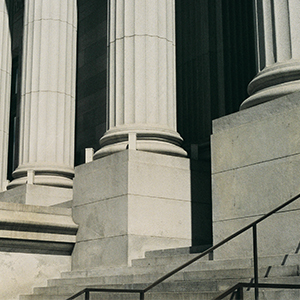Menu
Hot-Topics
February 19, 2026 | SCOTUS Reaffirms Fourth Amendment Standard for Police Responding to Household Emergencies
Month: September 2016

New Supreme Court Term Kicks Off with Oral Arguments in Five Cases
The U.S. Supreme Court’s new term gets into full swing next week. To kick off the new Supreme Court term, the justices will hear oral arguments in five cases, along with issuing orders and a meeting to consider additional cert petitions. ...

Cherokee Nation v Georgia: The Rights of Indian “Nations”
In Cherokee Nation v Georgia, 30 U.S. (5 Peters) 1 (1831), members of the Cherokee Nation sought to enjoin the state of Georgia from seizing their land. However, the U.S. Supreme Court held that it lacked the authority to enforce the rights of Native...

Craig v Missouri Interprets Prohibition of Bills of Credit Under Article I
In Craig v Missouri, 29 U.S. 410 (1830), the U.S. Supreme Court held that a Missouri statute authorizing loan certificates issued by the state violated Article I, section 10 of the Constitution, which prohibits states from issuing bills of credit. ...

SCOTUS to Consider Trinity Lutheran Church v Pauley—Public Funding for Religion
The U.S. Supreme Court recently agreed to consider Trinity Lutheran Church v Pauley, a case involving whether the state of Missouri violated the Constitution when it denied the Trinity Lutheran Church’s application for Missouri’s Scrap Tire Grant...

Murr v Wisconsin: Supreme Court to Clarify Regulatory Takings Under Fifth Amendment
Murr v Wisconsin is one of the October 2016 Term’s most-anticipated cases. The regulatory takings case will address whether two legally distinct but commonly owned contiguous parcels must be combined for takings analysis purposes. The Court’s dec...

Weston v City Council of Charleston: What Is a “Suit?”
In Weston v City Council of Charleston, 27 U.S. 449 (1829), the Supreme Court held that a city ordinance taxing interest-bearing stock of the United States was unconstitutional. The Court specifically found that the tax burdened the enumerated power ...

October 2016 Supreme Court Term Preview: Major Criminal Cases at Hand
The U.S. Supreme Court will return from its summer recess at the end of the month. The justices have already agreed to consider a number of significant criminal law cases over 2016-2017 Term. This post offers a brief preview. Bravo-Fer...

Willson v Black Bird Creek Marsh Company: The Dormant Commerce Clause
In Willson v Black Bird Creek Marsh Company, 27 U.S. (2 Pet.) 245 (1829), the U.S. Supreme Court held that a Delaware state law authorizing the building of a dam did not unconstitutionally usurp Congress's powers under the Commerce Clause because the...
Previous Articles
SCOTUS Decision in Bowe v. United States Is First of the 2026 Term
by DONALD SCARINCI on February 5, 2026
In Bowe v. United States, 607 U.S. ___ (2026), the U.S. Supreme Court held that Title 28 U.S.C. § ...
SCOTUS Rules State Can’t Immunize Parties from Federal Civil Liability
by DONALD SCARINCI on January 29, 2026
In John Doe v. Dynamic Physical Therapy, LLC, 607 U.S. ____ (2025) the U.S. Supreme Court held that...
Supreme Court to Address Racial Discrimination in Jury Selection
by DONALD SCARINCI onWhile the U.S. Supreme Court has concluded oral arguments for the year, it continues to add cases t...
The Amendments
-
Amendment1
- Establishment ClauseFree Exercise Clause
- Freedom of Speech
- Freedoms of Press
- Freedom of Assembly, and Petitition
-
Amendment2
- The Right to Bear Arms
-
Amendment4
- Unreasonable Searches and Seizures
-
Amendment5
- Due Process
- Eminent Domain
- Rights of Criminal Defendants
Preamble to the Bill of Rights
Congress of the United States begun and held at the City of New-York, on Wednesday the fourth of March, one thousand seven hundred and eighty nine.
THE Conventions of a number of the States, having at the time of their adopting the Constitution, expressed a desire, in order to prevent misconstruction or abuse of its powers, that further declaratory and restrictive clauses should be added: And as extending the ground of public confidence in the Government, will best ensure the beneficent ends of its institution.
Awards





